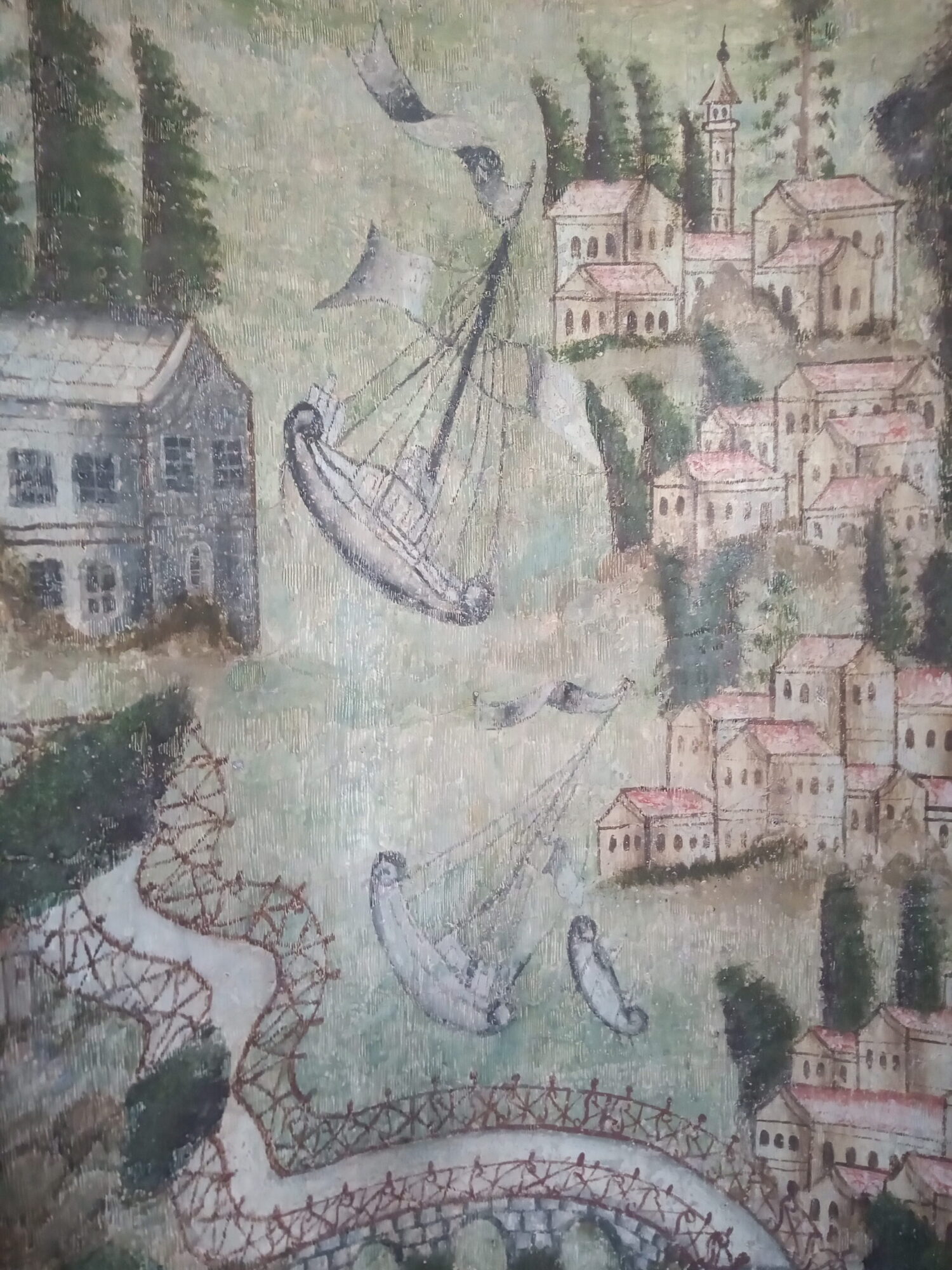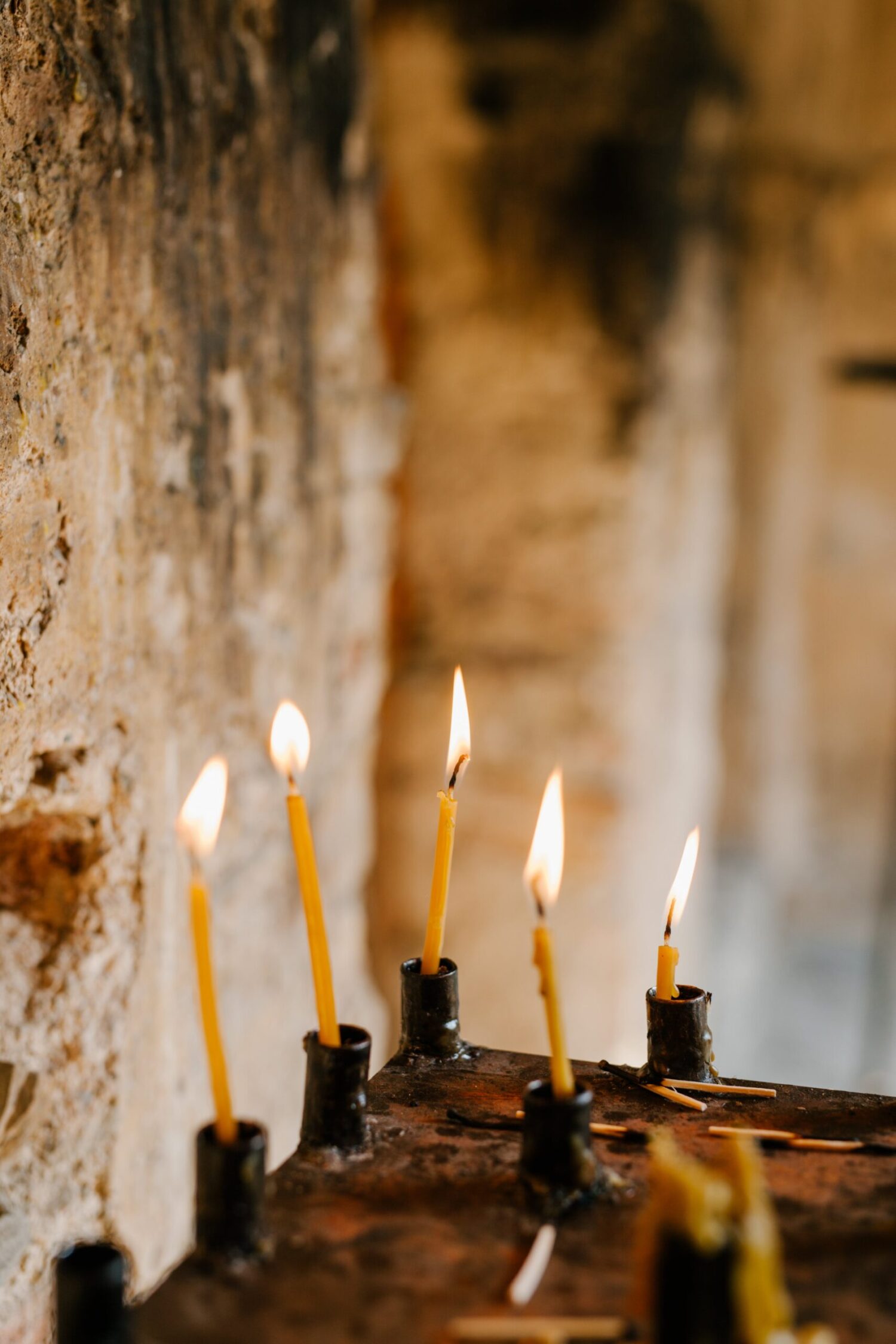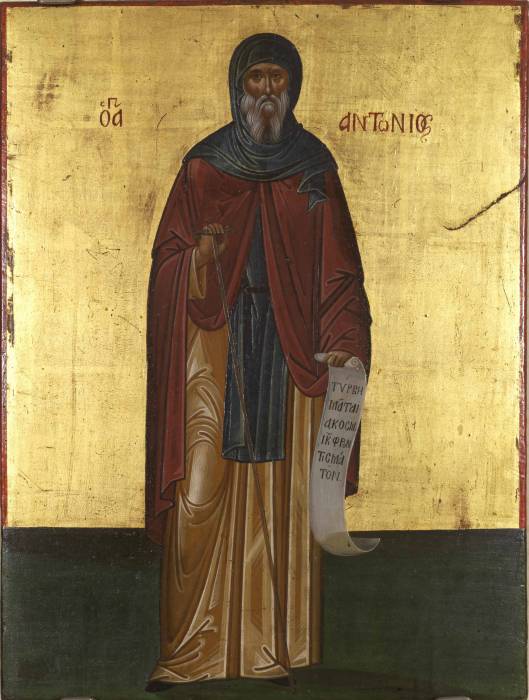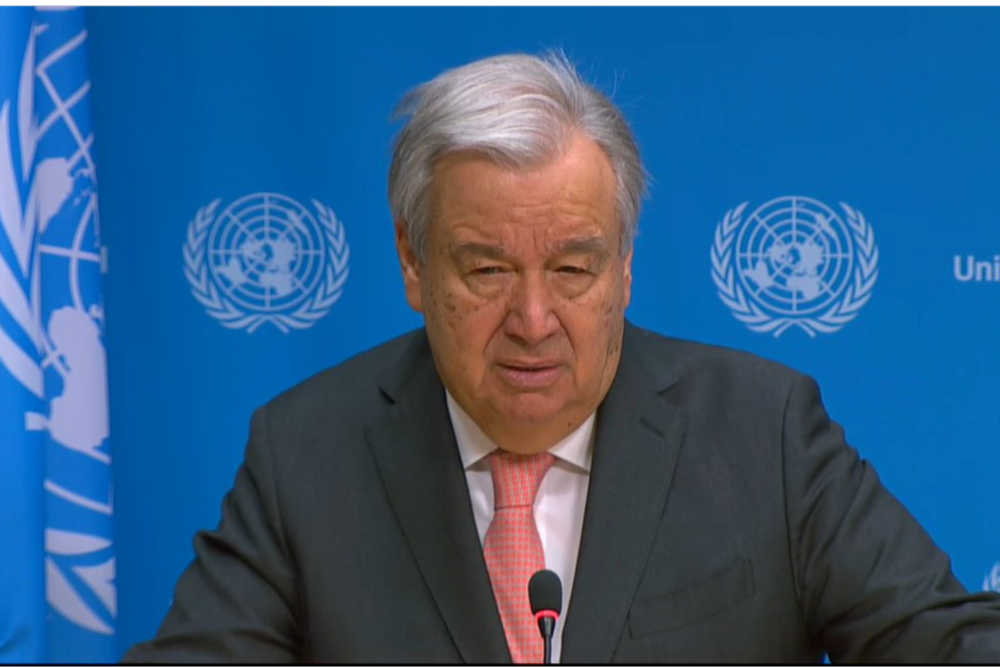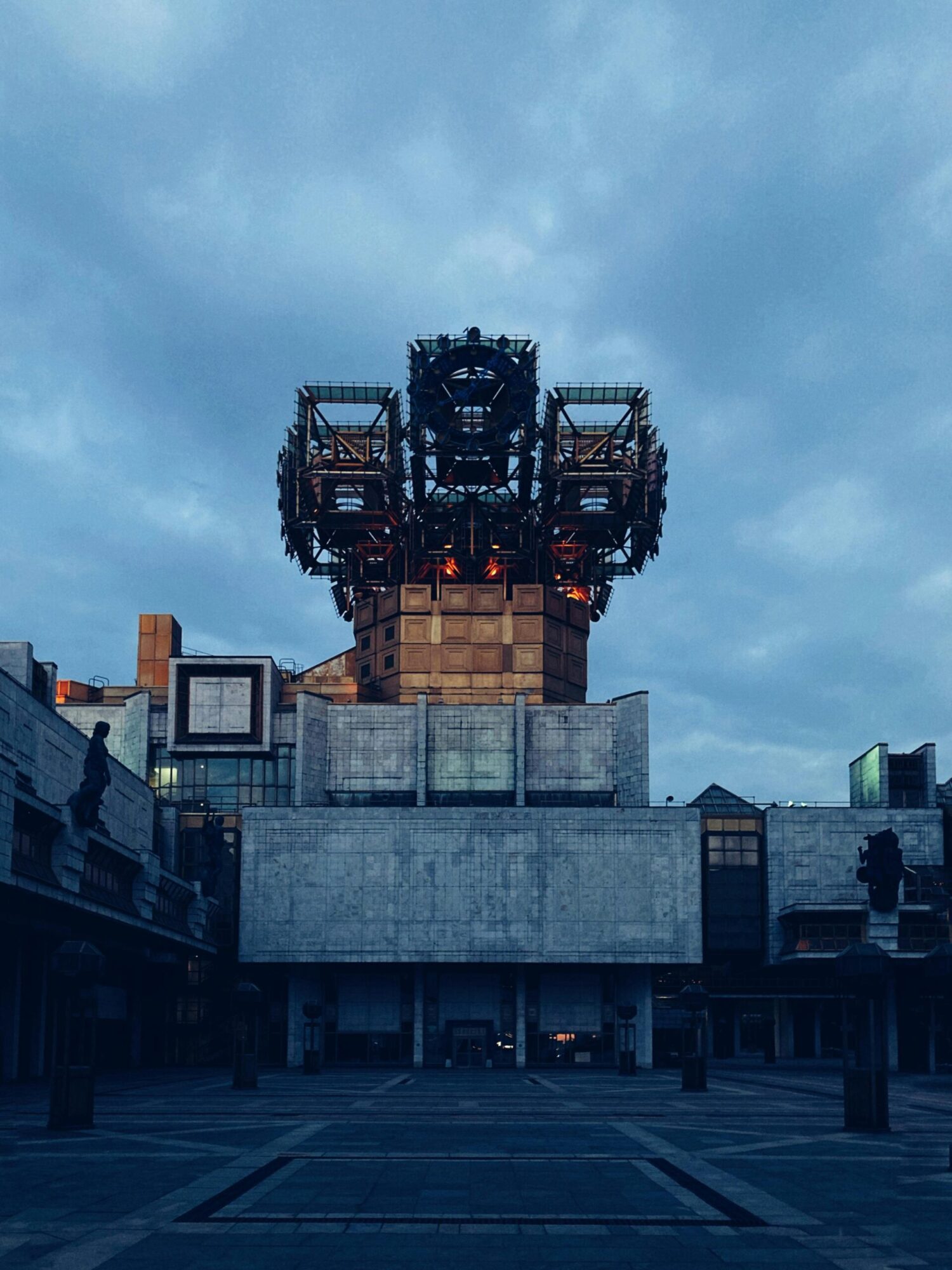By St. Athanasius of Alexandria
Chapter 3
Thus he (Antonius) spent about twenty years, exercising himself. And after this, when many had a burning desire and wanted to rival his life, and when some of his acquaintances came and forced his door, then Antony came out as from some sanctuary, initiated into the mysteries of the teaching and divinely inspired. And then for the first time he showed himself from his fortified place to those who came to him.
And when they saw him, they marveled that his body was in the same state, that it had neither been fattened by immobility, nor weakened by fasting and fighting with devils. He was as they knew him before his hermitage.
* * *
And many of those present who suffered from bodily diseases, the Lord healed through him. And others he cleansed of evil spirits and gave Antony the gift of speech. And so he comforted many who were grieving, and others, who were hostile, he turned into friends, repeating to all that they should not prefer anything in the world to the love of Christ.
By speaking to them and advising them to remember the future good things and the humanity shown to us by God, who did not spare His own Son, but gave Him for all of us, he persuaded many to accept the monastic life. And so, monasteries gradually appeared in the mountains, and the desert was populated with monks who left their personal lives and signed up to live in heaven.
* * *
One day, when all the monks came to him and wanted to hear a word from him, he said to them in the Coptic language the following: “The Holy Scriptures are sufficient to teach us everything. But it is good for us to encourage each other in the faith and strengthen ourselves with the word. You, like children, come and tell me like a father what you know. And I, being older than you, will share with you what I know and have gained from experience.”
* * *
“Above all, the first care of all of you should be: when you begin, not to relax and not to be discouraged in your labors. And do not say: “We have grown old in asceticism.” But rather every day increase your zeal more and more, as if you were starting for the first time. For all human life is very short compared with the ages to come. So our whole life is nothing compared to eternal life.”
“And every thing in the world is sold for what it is worth, and everyone exchanges like for like. But the promise of eternal life is bought for a small thing. Because the sufferings of this time are not equal to the glory that will be revealed to us in the future”.
* * *
“It is good to think of the words of the apostle who said: ‘I die every day.’ Because if we also live as if we die every day, then we will not sin. These words mean: waking up each day, thinking that we will not live to see the evening. And again, when we get ready to sleep, let’s think that we won’t wake up. Because the nature of our life is unknown and it is guided by Providence”.
“When we have this attitude of mind and live like this every day, we will neither sin, nor have a desire for evil, nor be angry with anyone, nor store up treasures on earth. But if we expect to die every day, we will be propertyless and forgive everyone everything. And we will not at all retain impure pleasure, but will turn away from it when it passes us by, fighting always and keeping in mind the day of the terrible judgment.
“And so, starting and walking the path of the benefactor, let us try harder to reach what is ahead. And let no one turn back like Lot’s wife. For the Lord also said: “No one who has put his hand to the plow and turns back is fit for the kingdom of heaven.”
“Do not be afraid when you hear of virtue, and do not be astonished at the word. Because it is not far from us and is not created outside of us. The work is in us and it is easy to do if we only wish. The Hellenes leave their homeland and cross the seas to learn science. However, we do not need to leave our homeland for the sake of the kingdom of heaven, nor to cross the sea for the sake of the benefactor. Because the Lord told us from the beginning: “The kingdom of heaven is within you.” So virtue needs only our desire.’
* * *
And so, on those mountains there were monasteries in the form of tents, full of divine choirs, who sang, read, fasted, prayed with cheerful hearts with hope for the future and worked to give alms. They also had love and agreement among themselves. And indeed, it could be seen that this is a separate country of piety to God and justice to men.
For there were no unjust and wronged, no complaint from a publican, but a gathering of hermits and one thought for virtue for all. Therefore, when someone saw the monasteries again and this such a good order of monks, he exclaimed and said: “How beautiful are your tents, Jacob, your dwellings, Israel! Like shady valleys and like gardens around a river! And like aloe trees, which the Lord planted in the earth, and like cedars near the waters!” (Num. 24:5-6).
Chapter 4
After that on the Church attacked the persecution that took place during the reign of Maximinus (emp. Maximinus Daya, note ed.). And when the holy martyrs were brought to Alexandria, then Antony also followed them, leaving the monastery and saying: “Let us go and fight, because they are calling us, or let us see the fighters ourselves.” And he had a great desire to become a witness and a martyr at the same time. And not wanting to surrender, he served the confessors in the mines and in the prisons. Great was his zeal to encourage the so-called fighters in the court to readiness for sacrifice, to welcome the martyrs and accompany them until they died.
* * *
And the judge, seeing his fearlessness and that of his companions, as well as their zeal, ordered that none of the monks should appear in the court, nor stay in the city at all. Then his friends all decided to hide that day. But Antony was so little troubled by this that he even washed his garment, and the next day he stood foremost, showing himself to the governor in all his dignity. Everyone was amazed at this, and the governor, when he was passing by with his detachment of soldiers, also saw it. Antony stood still and fearless, displaying our Christian valor. Because he wanted to be a witness and a martyr himself, as we said above.
* * *
But because he could not become a martyr, he looked like a man who mourned for it. However, God preserved him for the benefit of us and others, so that in the asceticism he had learned himself from the scriptures, he could become a teacher of many. Because just by looking at his behavior, many tried to become imitators of his way of life. And when the persecution finally stopped and the blessed bishop Peter became a martyr (in 311 – note ed.), then he left the city and again retired to the monastery. There, as is well known, Antony indulged in a great and even more austere asceticism.
* * *
And so, having retired into seclusion, and making it his task to spend some time in such a way that he neither appeared before the people, nor received anyone, there came to him a general named Martinianus, who disturbed his peace. This warlord had a daughter who was tormented by evil spirits. And as he waited a long time at the door and begged Antony to come out to pray to God for his child, Antony did not allow the door to be opened, but peeped in from above and said: “Man, why do you give me such a headache with your cries? I am a person like you. But if you believe in Christ, whom I serve, go and pray, and as you believe, so shall it be.” And Martinian, believing immediately and turning to Christ for help, went away and his daughter was cleansed of the evil spirit.
And many other wonderful works were done through him by the Lord, who says: “Ask and it will be given to you!” (Mat. 7:7). So that without him opening the door, many of the sufferers, just by sitting before his abode, exercised faith, prayed earnestly, and were healed.
CHAPTER FIVE
But because he saw himself disturbed by many and was not left to live in hermitage, as he wanted according to his own understanding, and also because he was afraid that he might become proud of the works that the Lord was doing through him, or that someone else would think such a thing for him, he decided and set out to go to Upper Thebaid to the people who did not know him. And having taken bread from the brothers, he sat on the bank of the river Nile and watched whether a ship would pass by so that he could board and go with him.
While he was thinking in this way, a voice came to him from above: “Antonio, where are you going and why?”. And he, hearing the voice, was not embarrassed, because he was used to being called that way, and answered with the words: “Because the crowds do not leave me alone, therefore I want to go to Upper Thebaid because of the many headaches that I have caused by the people here, and especially because they ask me for things that are beyond my powers.” And the voice said to him: “If you want to have real peace, go now deeper into the desert.”
And when Antony asked: “But who will show me the way, because I do not know him?”, the voice immediately directed him to some Arabs (the Copts, descendants of the ancient Egyptians, distinguish themselves from the Arabs both by their history and by their culture, note ed.), who were just preparing to travel this way. Going and approaching them, Antony asked them to go with them into the desert. And they, as if by order of providence, accepted him favorably. He traveled with them for three days and three nights until he came to a very high mountain. Clear water, sweet and very cold, sprang up under the mountain. And outside there was a flat field with a few date palms that bore fruit without human care.
* * *
Anthony, brought by God, loved the place. Because this was the same place that the One who spoke to him by the banks of the river had shown him. And at first, having received bread from his companions, he remained in the mountain alone, without anyone with him. Because he finally reached the place he recognized as his own home. And the Arabs themselves, having seen Antony’s zeal, then purposely passed that way and brought him bread with joy. But he also had a meager but cheap food from the date palms. Accordingly, when the brothers learned of the place, they, like children who remember their father, took care to send him food.
However, when Antony realized that some people there were struggling and toiling for this bread, he felt sorry for the monks, thought to himself and asked some of those who came to him to bring him a hoe and an ax and some wheat. And when all this was brought to him, he went around the land around the mountain, found a very small place suitable for the purpose and began to cultivate it. And because he had enough water for irrigation, he sowed the wheat. And this he did every year, getting his living from it. He was glad that in this way he would not bore anyone and that in everything he was careful not to burden others. After that, however, seeing that some people were still coming to him, he also planted some sedge, so that the visitor could have a little relief in his efforts from the difficult journey.
* * *
But in the beginning, the animals from the desert, who came to drink water, often damaged his cultivated and sown crops. Antony meekly caught one of the beasts and said to them all: “Why do you harm me when I do not harm you? Go away and in the name of God do not come near these places!”. And from that time on, as if frightened by the order, they no longer approached the place.
Thus he lived alone in the interior of the mountain, devoting his free time to prayer and spiritual exercise. And the brothers who served him asked him: coming every month, to bring him olives, lentils and wood oil. Because he was already an old man.
* * *
Once asked by the monks to come down to them and visit them for a while, he traveled with the monks who came to meet him, and they loaded bread and water on a camel. But this desert was entirely waterless, and there was no water to drink at all, except only in that mountain where his abode was. And because there was no water on their way, and it was very hot, they all risked exposing themselves to danger. Therefore, after going around many places and not finding water, they could not go any further and lay down on the ground. And they let the camel go, despairing of themselves.
* * *
However, the old man, seeing everyone in danger, was deeply grieved and in his grief withdrew a little from them. There he knelt, folded his hands and began to pray. And immediately the Lord caused water to gush out where he had stood to pray. So, after drinking, they all revived. And having filled their pitchers, they looked for the camel and found it. It happened that the rope wound around a stone and got stuck in that place. Then they took her and watered her, put the pitchers on her, and went the rest of the way unharmed.
* * *
And when he reached the outer monasteries, they all looked at him and greeted him as a father. And he, as if he had brought some provisions from the forest, greeted them with warm words, as guests are greeted, and repaid them with help. And again there was joy on the mountain and competition for progress and encouragement in the common faith. Moreover, he also rejoiced, seeing, on the one hand, the zeal of the monks, and on the other, his sister, who was old in virginity and was also the leader of other virgins.
After a few days he went to the mountains again. And then many came to him. Even some who were sick dared to climb. And to all the monks who came to him, he constantly gave this advice: To believe in the Lord and to love Him, to beware of impure thoughts and carnal pleasures, to avoid idle talk and to pray incessantly.
CHAPTER SIX
And in his faith he was diligent and completely worthy of admiration. For he never communicated either with the schismatics, followers of Meletius, because he knew from the first their malice and their apostasy, nor did he speak in a friendly manner with the Manichaeans or with other heretics, except so far as to instruct them, thinking and declaring that friendship and communication with them is harm and destruction for the soul. So also he abhorred the heresy of the Arians, and commanded all not to approach them, nor to accept their false teaching. And when once some of the insane Arians came to him, he, having tested them and found that they were wicked people, drove them out of the mountain, saying that their words and thoughts were worse than serpent’s poison.
* * *
And when at one time the Arians declared falsely that he thought alike with them, then he was indignant and very angry. Then he came down from the mountain, because he was called by the bishops and all the brothers. And when he entered Alexandria, he condemned the Arians in front of everyone, saying that this was the last heresy and the forerunner of the Antichrist. And he taught the people that the Son of God is not a creation, but that he is Word and Wisdom and is of the essence of the Father.
And all rejoiced to hear such a man curse the heresy against Christ. And the people of the city flocked together to see Antony. The heathen Greeks, and their so-called priests themselves, came to the church saying: “We want to see the man of God.” Because everyone told him so. And because there too the Lord cleansed many from evil spirits through him and healed those who were insane. And many, even pagans, only wanted to touch the old man, because they believed they would benefit from it. And indeed in those few days as many people became Christians as he had hardly seen anyone become in a whole year.
* * *
And when he started to return and we accompanied him, after we reached the city gate, a woman called out behind us: “Wait, man of God! My daughter is terribly tormented by evil spirits. Wait, I’m begging you, so that I don’t get hurt when I run.” Hearing this, and begged by us, the old man agreed and stopped. And when the woman approached, the girl threw herself on the ground, and after Antony prayed and mentioned the name of Christ, the girl woke up healed, because the unclean spirit had left her. Then the mother blessed God and everyone gave thanks. And he rejoiced, going to the mountain as if to his own home.
Note: This life was written by St. Athanasius the Great, Archbishop of Alexandria, one year after the death of Rev. Anthony the Great († January 17, 356), i.e. in 357 at the request of Western monks from Gaul (d. France) and Italy, where the archbishop was in exile. It is the most accurate primary source for the life, exploits, virtues and creations of St. Anthony the Great and played an extremely important role in the establishment and flourishing of monastic life both in the East and in the West. For example, Augustine in his Confessions speaks of the strong influence of this life on his conversion and improvement in faith and piety.



